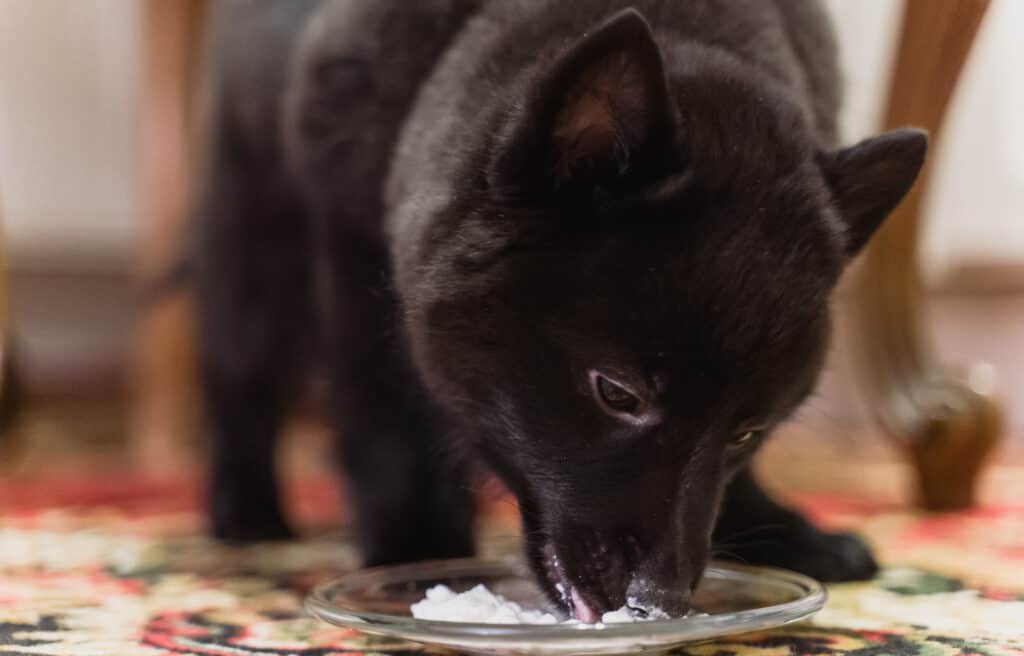Dogs can consume sour cream just fine in most cases. It isn’t blatantly toxic and usually doesn’t require veterinary attention. However, some dogs are lactose intolerant. In these cases, dogs may experience an upset stomach and similar symptoms.
Luckily, even if a dog is lactose intolerant, the symptoms should be rather minor.
However, if your dog experiences serious diarrhea or has underlying health problems, you may want to speak to your vet. While sour cream isn’t reportedly deadly, diarrhea could theoretically lead to dehydration.
What Should I Do if My Dog Ate Sour Cream?
In most cases, you shouldn’t have anything to worry about. Sour cream may cause a slight upset stomach in dogs that are lactose intolerant or not used to consuming sour cream. However, small-to-moderate amounts aren’t anything to be concerned with.
Even if your dog has underlying health problems, most vets will recommend a “wait and see” approach when it comes to consuming sour cream. it simply isn’t toxic, so it doesn’t cause problems for most dogs.
However, this doesn’t mean that you should purposefully give your dog sour cream. In many cases, dogs may experience stomach upset. Those who are lactose intolerant are even worse off.

Dogs may be able to eat small amounts of sour cream but just be sure yours isn’t lactose-intolerant first.
©M-Production/Shutterstock.com
Can Sour Cream Settle a Dog’s Stomach?
Sour cream can contain probiotics. These small microbes are helpful bacteria that our dogs (and we) need in our stomachs to properly digest food. Therefore, without the proper microbes, our dogs may have difficulty digesting food and experience regular stomach problems.
Because some brands of sour cream contain microbes, they may theoretically help our dogs’ stomachs. However, this is a long-term fix – not a quick cure. It would take a long time regularly feeding your dog sour cream to ensure that they ate enough probiotics.
While giving your dog a little bit of sour cream isn’t going to hurt them, you probably don’t want to make it a regular part of their diet. Sour cream doesn’t contain much nutrition and is high in fat, which can be a problem for many canines. Overtime, it may lead to underlying conditions like fatty liver disease.
The probiotics in sour cream are not usually canine-specific, either. While dogs can benefit from many of the same microbes that we do, they may benefit most for certain probiotics we typically don’t eat. Therefore, sour cream may help your dog, but not as much as other sources.
Plus, there are many other ways to give your dog probiotics.

Sour cream has probiotics but there are plenty of more efficient sources of probiotics to feed your dog.
©Varvara Serebrova/Shutterstock.com
Better Probiotic Sources for Dogs
Besides sour cream, there are many better probiotic sources for dogs.
Our first recommendation is to choose a quality food with probiotics already inside. Usually, this is the easiest way to provide your dog with probiotics, since you’ll be feeding them every day anyway. However, just because probiotics are listed on the bag doesn’t actually mean that any of them will survive in your dog’s stomach.
Therefore, it is vital to choose quality probiotics. Research the brand of dog food before you buy.
(While we’re discussing it, we also recommend looking for foods with fiber and prebiotics. These help the bacteria your dog already has in their gut.)
You can also choose natural sources of probiotics. Of these, our favorite is kefir or Greek yogurt. Both of these regularly contain probiotics in most cases. However, some brands may remove these probiotics before the food hits the shelf. Therefore, you’ll need to double-check the label before you purchase the food.
Furthermore, you should only choose kefir or Greek yogurt that is not sweetened or flavored. These artificial ingredients can be a problem for many canines, so they should be avoided.
Probiotic treats also exist. However, these typically have the same problem as probiotic dog food. Some brands are much better than others. Therefore, you’ll need to do a great deal of research first.
In extreme cases, your vet may recommend probiotic capsules. Usually, these are given to dogs with known gut biome problems. They may also help with some underlying conditions, like allergies. Powders are also available and have a similar benefit.
What to Feed a Dog Who Won’t Eat?
When your dog won’t eat, many people will recommend feeding them a wide variety of foods. For instance, fatty foods like sour cream may be recommended, as many dogs tend to love these fatty foods in particular.
However, this isn’t necessarily recommended. Usually, if a dog will not eat, then there is an underlying issue. After all, dogs just don’t stop eating for no reason. Furthermore, the underlying problem is usually more of an issue than the fact that the dog is not eating.
Therefore, if your dog isn’t eating, we highly recommend contacting your vet. Usually, your dog will need to be seen unless the reason for them not eating is already known (like a recent surgery).
We don’t recommend trying to feed your dog anything new to encourage them to eat. After all, new food items often upset dogs’ stomachs, which can make the whole issue much worse. Therefore, we recommend speaking with your vet first. If they give the okay to introduce other foods, then you can do so.
However, we don’t recommend giving them sour cream as one of these encouraging foods. There are lots of other options out there that are often better for many dogs.
Better Options for Dogs That Won’t Eat
The best option for dogs that won’t eat is plain chicken, fish, or similar lean meat. Avoid fatty meats, as these can upset a dog’s stomach, especially if they aren’t used to them. However, you should also be careful not to give any food with seasonings. Many seasonings, like onions and garlic, are toxic to dogs.
Even salt can be too much for many canines. While dogs do need sodium just like us, the amount of salt typically added to human foods if way too much for most dogs. Therefore, cook the chicken or other lean meat completely plain without any additives like seasonings or salt.
If fresh, plain meat won’t encourage your dog to eat, there are a few other options. Low-sodium chicken broth can be utilized and added to the dog’s normal food. Be sure to choose a low-sodium option, as regular broth has too much sodium for many dogs.
There are some veggies that can be given to dogs, as well. Canned pumpkin is a great option, as it may also help prevent stomach upset. However, be sure to give your dog plain canned pumpkin. Many canned pumpkin products have added sugar in them, which is not suitable for dogs.

Be sure not to give your dog any seasoned food, especially any foods with garlic or onions.
©Africa Studio/Shutterstock.com
Can Dogs Have Cheese?
Cheese is perfectly safe for dogs in moderation. It can be a great alternative to dog treats, especially if your dog has many allergies. Furthermore, some dogs are intolerant of cheese. Therefore, these dogs should not be given cheese at all. It is best to test a small amount of cheese with your dog first.
If they tolerate a small amount, then you can use a moderate amount for training purposes or as a treat. Cheese is very high in protein and calcium, which makes it a better option than most other “human foods.”
However, cheese is also very fatty. Therefore, you should not feed too much to your canine. Otherwise, it can lead to weight gain and obesity. Plus, there are also some health conditions associated with consuming too much fat, such as pancreatitis.
There are plenty of low-fat cheeses that are better for dogs. For instance, mozzarella, cottage cheese, and soft goat cheese are great options. However, these are also harder to give many dogs.
Conclusion
Sour cream is not toxic to dogs. Therefore, if your dog eats a small to moderate amount one time, you have nothing to worry about. However, sour cream isn’t something that you should give to your dog constantly.
It can cause issues for many dogs, as it contains a high amount of lactose. Many dogs are lactose-intolerant, which means that they may experience stomach upset and similar problems when they consume too much lactose.
However, most reactions are minor, so you don’t necessarily need to visit the vet right away. No serious reactions to sour cream requiring hospitalization have been reported. With that said, lactose intolerance can cause diarrhea, which can lead to dehydration.
Therefore, if your dog has a serious reaction to sour cream, you may want to call your vet.
The photo featured at the top of this post is © Ericaaa/Shutterstock.com
Thank you for reading! Have some feedback for us? Contact the AZ Animals editorial team.






